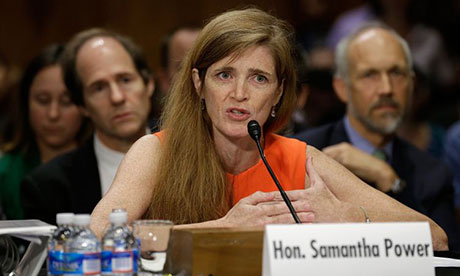Obama's UN nominee Samantha Power highlights Syria and Israel
Power tells confirmation hearing the failure of the UN to stem slaughter in Syria is 'a disgrace that history will judge harshly'
Reuters in Washington, guardian.co.uk,Thursday 18 July 2013 04.26 BST, Source

Samantha Power testifies before the foreign relations committee. Photograph: Win McNamee/Getty
Samantha Power, President Barack Obama's nominee to be the US ambassador to the United Nations, has promised during her Senate confirmation hearing to push for action on Syria and fight what she termed "unacceptable bias" against Israel at the world body.
"We see the failure of the UN security council to respond to the slaughter in Syria – a disgrace that history will judge harshly," Power said in testimony to the Senate foreign relations committee on Wednesday.
The 42-year-old, best known as a human rights advocate, is expected to win strong support for her confirmation in the committee and full Senate. The foreign relations panel is likely to vote on Power's nomination on Tuesday, said Senator Robert Menendez, its chairman.
During mostly friendly questioning, Power, who won a Pulitzer Prize for her study of US failures to prevent genocide, called Syria one of the "most devastating cases of mass atrocity that I have ever seen".
President Bashar al-Assad's government had "written a new playbook for brutality", she said. She said Washington needed to push Russia in particular on Syria, although she acknowledged she did not expect action soon.
Power said the United Nations should do more to push Iran to negotiate an end to its nuclear programme. Noting that she had been part of the Obama administration's push for tough sanctions, Power said she backed tightening them by closing loopholes.
Nominated to replace the new national security adviser, Susan Rice, Power also took a tough line on attitudes in the United Nations towards Israel.
She promised to end what she termed "unacceptable bias and attacks" against the close US ally, singling out Iran for criticism.
She said she would lobby for Israel to get a seat on the security council, a US policy that has been blocked by many other countries.
Power had been criticised by some conservatives for seeming to suggest, in a 2002 interview with an academic, that the US army might be needed to police the Middle East conflict if it escalated.
Power has disassociated herself many times from that comment. On Wednesday, she called it part of "a long, rambling and remarkably incoherent response to a hypothetical question that I should never have answered".
There was some pointed questioning about past statements – some made more than a decade ago – but Power was praised by many Republicans, as well as by Obama's fellow Democrats. Several senators said they looked forward to her UN tenure.
Senator Bob Corker, the top Republican on the committee, said he expected Power would be "a significant and positive force at the United Nations", but was one of several senators who urged her to pursue reforms at the world body.
"All too often the UN acts as a place where bad actors deflect criticism," he said.
